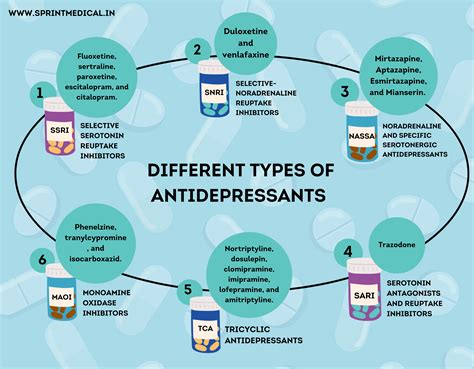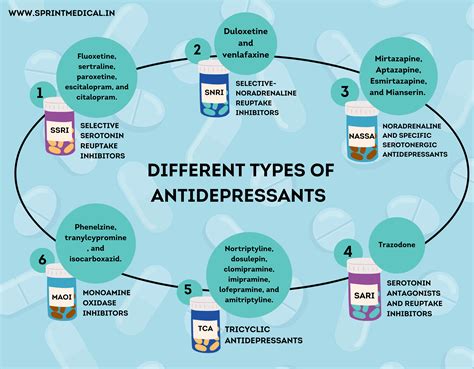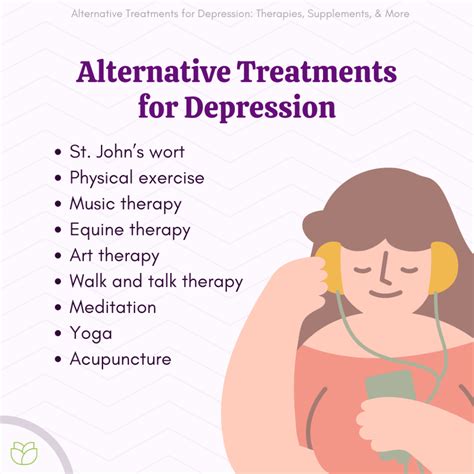Intro
Discover what antidepressants are, their types, and uses. Learn about selective serotonin reuptake inhibitors, serotonin-norepinephrine reuptake inhibitors, and tricyclic antidepressants for mental health treatment.
Antidepressants are a type of medication that is used to treat depression, anxiety, and other mood disorders. They work by altering the levels of certain chemicals in the brain, such as serotonin and dopamine, which are associated with mood regulation. Antidepressants are often prescribed by doctors and can be an effective treatment for many people who struggle with mental health issues.
The importance of understanding antidepressants cannot be overstated, as they are a commonly used treatment for a wide range of mental health conditions. According to the World Health Organization (WHO), depression is a leading cause of disability worldwide, affecting over 300 million people. Antidepressants can provide relief from symptoms such as low mood, loss of interest in activities, and changes in appetite or sleep patterns. However, it's essential to approach the use of antidepressants with caution and to be aware of their potential benefits and risks.
The topic of antidepressants is complex and multifaceted, and there is much to learn about how they work, their different types, and their potential side effects. By exploring the world of antidepressants, readers can gain a deeper understanding of the options available for managing mental health conditions and make informed decisions about their treatment. Whether you're struggling with depression, anxiety, or another mood disorder, or simply want to learn more about antidepressants, this article aims to provide a comprehensive overview of the subject.
Introduction to Antidepressants

How Antidepressants Work
Antidepressants work by altering the levels of certain chemicals in the brain, such as serotonin, dopamine, and norepinephrine. These chemicals play a crucial role in regulating mood, appetite, and sleep patterns. By increasing the levels of these chemicals, antidepressants can help to alleviate symptoms of depression and anxiety. The exact mechanism of action of antidepressants is not fully understood, but it is thought that they work by:- Increasing the levels of serotonin and other neurotransmitters in the brain
- Blocking the reabsorption of serotonin and other neurotransmitters
- Altering the activity of certain brain cells
Types of Antidepressants

- Selective serotonin reuptake inhibitors (SSRIs)
- Serotonin-norepinephrine reuptake inhibitors (SNRIs)
- Tricyclic antidepressants (TCAs)
- Monoamine oxidase inhibitors (MAOIs)
- Atypical antidepressants
Each type of antidepressant has its own advantages and disadvantages, and the choice of medication will depend on the individual's specific needs and circumstances.
Benefits of Antidepressants
Antidepressants can provide a range of benefits for people who struggle with mental health conditions. Some of the benefits of antidepressants include:- Relief from symptoms of depression and anxiety
- Improved mood and reduced risk of suicidal thoughts
- Increased energy and motivation
- Improved sleep patterns and appetite
- Enhanced ability to function in daily life
However, antidepressants can also have potential side effects, and it's essential to weigh the benefits against the risks.
Potential Side Effects of Antidepressants

- Nausea and vomiting
- Headaches and dizziness
- Changes in appetite and weight
- Sleep disturbances
- Increased risk of suicidal thoughts and behaviors
It's essential to discuss the potential side effects of antidepressants with a doctor or psychiatrist before starting treatment.
Steps to Take When Starting Antidepressants
If you're considering starting antidepressants, there are several steps you can take to ensure a safe and effective treatment:- Consult with a doctor or psychiatrist to discuss your treatment options
- Carefully read and follow the instructions on the medication label
- Monitor your symptoms and side effects closely
- Attend regular follow-up appointments with your doctor or psychiatrist
- Be patient and give the medication time to take effect
By following these steps, you can minimize the risks associated with antidepressants and maximize their benefits.
Alternative Treatments for Depression and Anxiety

- Therapy and counseling
- Lifestyle changes, such as regular exercise and healthy eating
- Mindfulness and meditation practices
- Herbal supplements, such as St. John's Wort and omega-3 fatty acids
It's essential to discuss these alternative treatments with a doctor or psychiatrist to determine the best course of treatment for your individual needs.
Conclusion and Next Steps
In conclusion, antidepressants can be a valuable treatment option for people who struggle with mental health conditions. By understanding how antidepressants work, their potential benefits and risks, and alternative treatments, you can make informed decisions about your treatment. If you're considering starting antidepressants, be sure to consult with a doctor or psychiatrist and carefully follow their instructions.What are the most common types of antidepressants?
+The most common types of antidepressants include selective serotonin reuptake inhibitors (SSRIs), serotonin-norepinephrine reuptake inhibitors (SNRIs), tricyclic antidepressants (TCAs), monoamine oxidase inhibitors (MAOIs), and atypical antidepressants.
How long does it take for antidepressants to take effect?
+Antidepressants can take several weeks to take effect, with some people experiencing benefits within 1-2 weeks and others taking 6-8 weeks or longer to respond.
Can antidepressants be used to treat anxiety?
+Yes, antidepressants can be used to treat anxiety, with SSRIs and SNRIs being commonly prescribed for anxiety disorders.
We hope this article has provided you with a comprehensive overview of antidepressants and their role in treating mental health conditions. If you have any further questions or concerns, please don't hesitate to reach out to a healthcare professional. Additionally, we encourage you to share this article with others who may be struggling with mental health issues and to engage in the conversation by commenting below. Together, we can work towards reducing stigma and promoting awareness about mental health.
